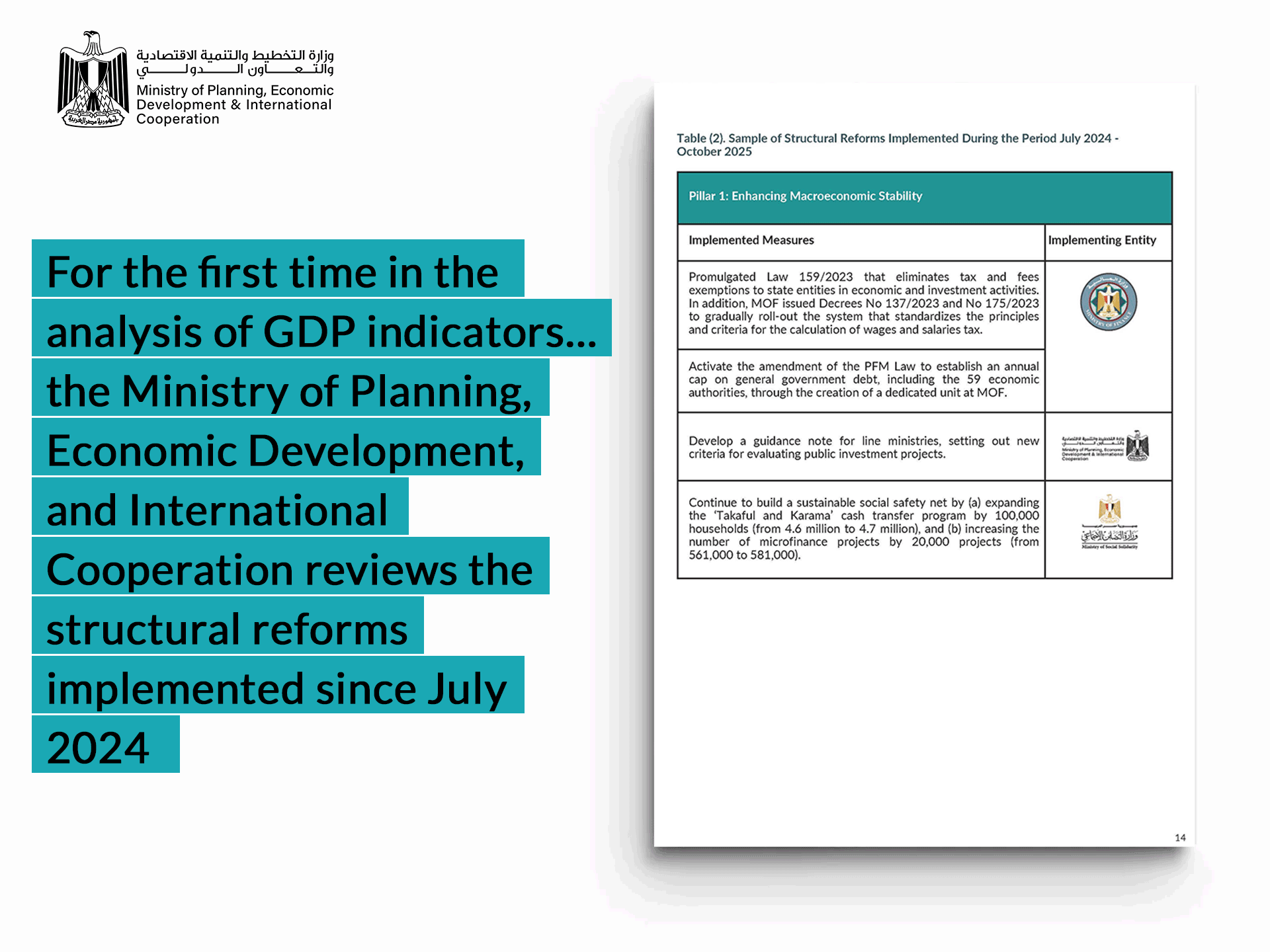• Dr. Rania Al-Mashat: We are keen on reinforcing the principles of transparency and governance in reviewing indicators of Egypt’s economic growth
• Linking economic growth developments to the structural reforms implemented… and continuing implementation according to a defined timeline within “Egypt’s Narrative for Economic Development”
• Presenting the reforms comes within the framework of effective communication with citizens and the business community to reaffirm the State’s private-sector–oriented approach
• The government continues to implement the National Program for Structural Reforms to ensure the sustainability of economic stability and achieve further improvements in the business climate and investment environment
• More than 60 structural reforms implemented since July 2024 have contributed to strengthening private-sector confidence and consolidating macroeconomic stability
The Ministry of Planning, Economic Development, and International Cooperation announced the inclusion of a set of structural reforms implemented since July 2024 within the framework of the National Program for Structural Reforms for the first time in the GDP growth indicators for the first quarter of fiscal year 2025/2026, in a manner that reinforces the principles of transparency and governance and reflects the sustainability of Egypt’s economic reform path.
H.E. Dr. Rania Al-Mashat, Minister of Planning, Economic Development, and International Cooperation, reaffirmed that presenting these reforms comes within the framework of the Ministry’s keenness to consolidate the principles of transparency and governance in reviewing economic reform indicators and GDP growth, in a way that reinforces the State’s vision aimed at sustaining economic reform that is reflected in the real economy and achieves comprehensive and sustainable development.
Minister Al-Mashat added that presenting these reforms also comes within the framework of effective communication with citizens and the business community, emphasizing the State’s private-sector–oriented approach and its keenness on opening the way for domestic and foreign investments through the governance of public investments, improving the investment climate, and facilitating the business environment.
H.E. noted that the government continues to implement the National Program for Structural Reforms to ensure the sustainability of economic stability and achieve further improvements in the business climate and investment environment while encouraging green investments, in accordance with the announced timeline under “Egypt’s Narrative for Economic Development,” underscoring that stability enables reform and reform enhances stability, thereby solidifying the foundations of economic development.
H.E. further pointed out that the State has implemented more than 60 structural reforms since July 2024, contributing to strengthening private-sector confidence and consolidating macroeconomic stability.
These reforms include the issuance of Law No. 159/2023, which abolishes tax and fee exemptions for State entities engaged in economic and investment activities, as well as the activation of the Public Finance Law to set an annual ceiling for general government debt—covering 59 public economic entities—through the establishment of a dedicated unit at the Ministry of Finance.
The Ministry of Planning, Economic Development, and International Cooperation also issued a guiding document circulated to executive ministries outlining new criteria for evaluating public investment projects. In parallel, and as part of strengthening social safety nets, the State has worked to increase the number of beneficiaries of the Takaful and Karama Program.
Improving the Investment Climate
In terms of enhancing competitiveness and improving the business environment, several reforms have been implemented, including amendments to the Executive Regulations of the Investment Law, streamlining procedures related to issuing the Golden License, and strengthening competitive neutrality through the Egyptian Competition Authority’s issuance of three guidelines in this regard.
Law No. 170 of 2025 was also issued to regulate certain provisions related to State ownership in State-owned companies and to establish the State-Owned Companies Unit under the supervision of the Cabinet.
Additionally, the new Labor Law No. 14 of 2025 was issued as one of the reforms that addresses challenges related to improving the business environment while enhancing workers’ rights. A simplified tax regime for start-ups has also been introduced, under which any start-up with annual revenues not exceeding EGP 20 million may access new incentives, exemptions, and facilitations, including a simplified income tax rate ranging from 0.4% to 1.5%, depending on annual business volume.
Registered companies under this regime will also be exempted from capital gains tax on the disposal of fixed assets, machinery, or production equipment, as well as from profit distribution taxes and stamp duties.
